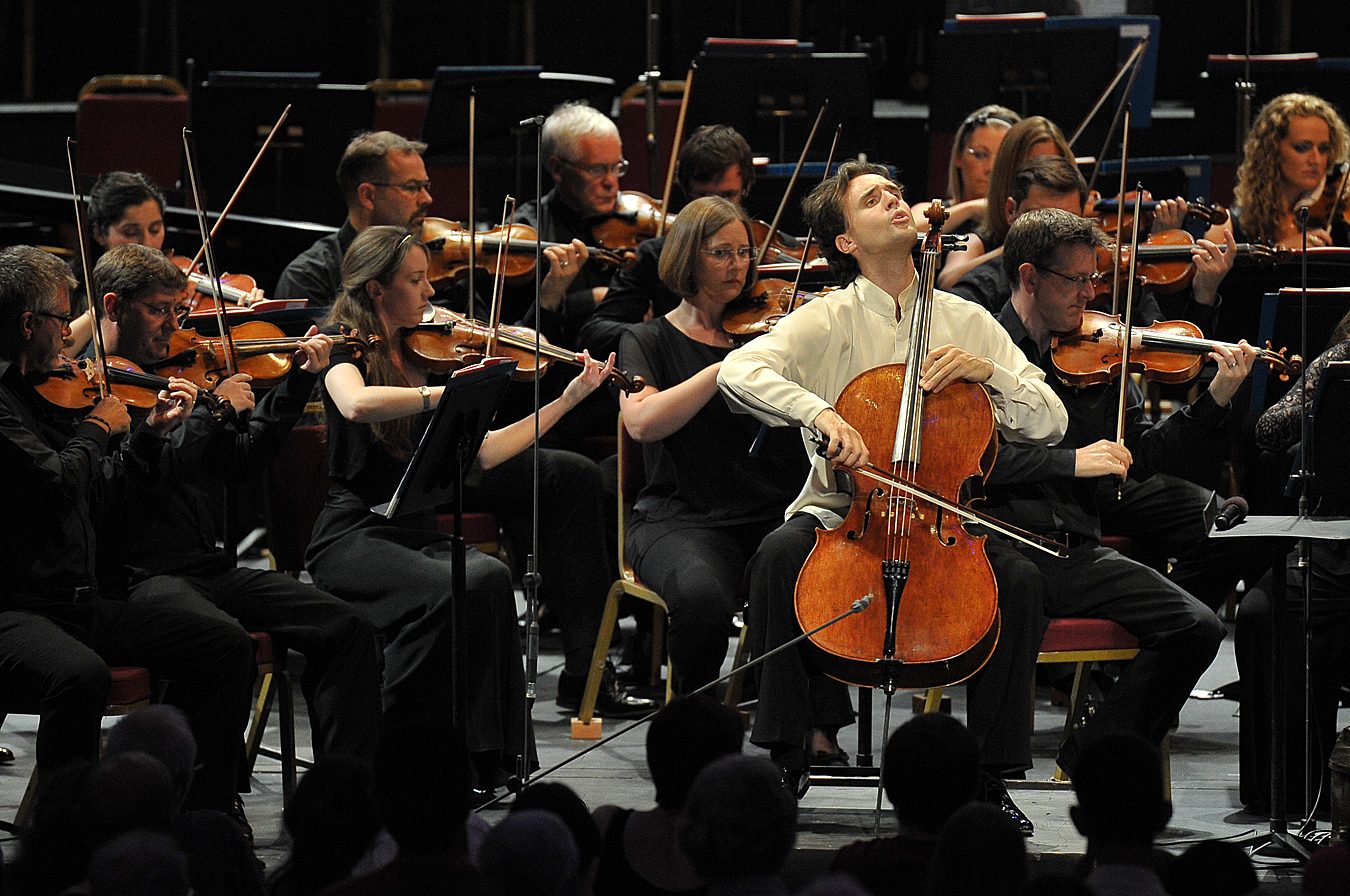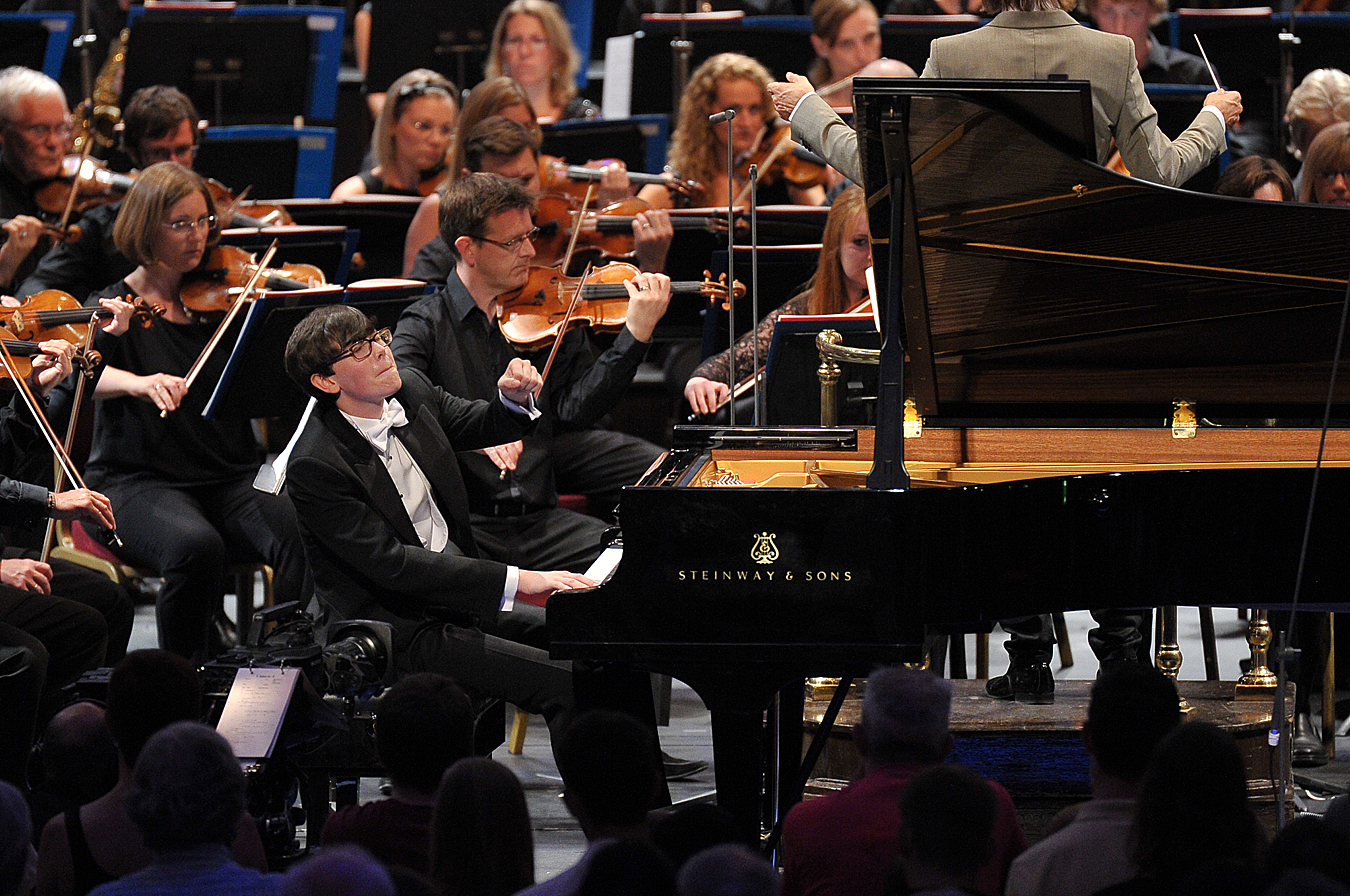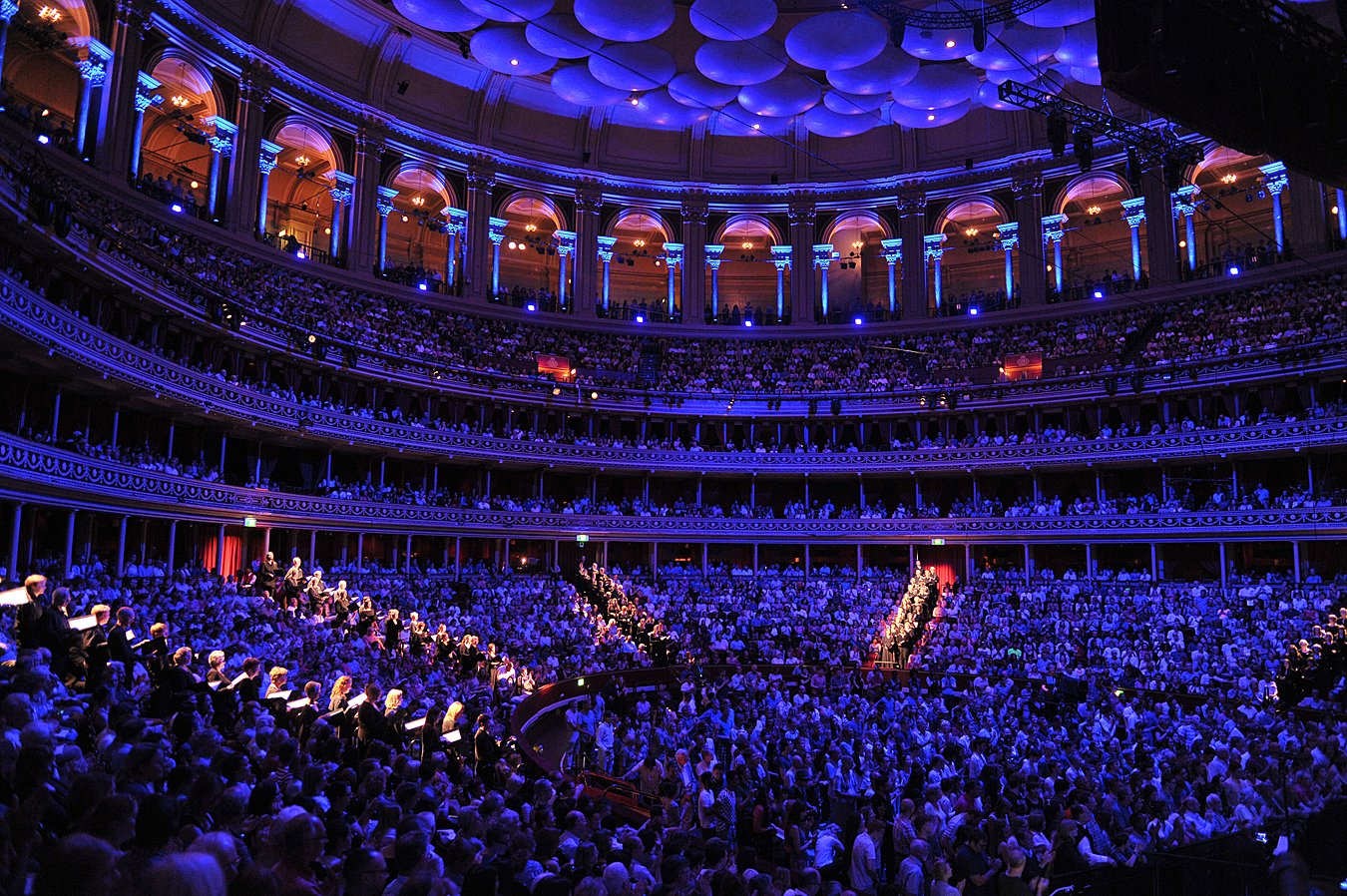Prom 32: Bartlett, Elschenbroich, RPO, Whitacre | reviews, news & interviews
Prom 32: Bartlett, Elschenbroich, RPO, Whitacre
Prom 32: Bartlett, Elschenbroich, RPO, Whitacre
The poster boy of American choral music offers up a mixed bag
The England cricket team recently went through seven Test matches alternating winning and losing, the longest such sequence in the history of the game. Eric Whitacre managed a similar, and similarly frustrating, series of hits and misses in his Sunday matinee Prom of American music with the Royal Philharmonic Orchestra.
Whitacre featured as both composer (of four of the pieces) and conductor, the programming showing the strengths but also the limitations of both of these aspects of his work. As a presenter, though, he is excellent, speaking to the audience between items with assurance and humour, covering the rearrangements of the platform and introducing the music in a way that is unpretentious and welcoming. This was not the stuffy concert environment that can put off newcomers.
The opening item was also neither stuffy nor pretentious: the European premiere of Jonathan Newman’s Blow It Up, Start Again. This was composed as an encore but is perfect as a miniature overture, fizzing with big-band grooves, heavy on the low brass and percussion, and entertainingly hectic.

The highlight of the afternoon was Whitacre’s breakthrough choral piece Cloudburst, sung here by the combined forces of the BBC Singers and BBC Symphony Chorus and conducted from memory by Whitacre, spotlit in the centre of the stage. Written when he was only 21, it sets a text adapted from Octavio Paz about rain coming to a parched land. The variety of textures, from solo moments to full tutti, were well handled by the large choir and the Spanish pronunciation was very convincing. But the piece is memorable above all for the coup de théâtre at the end, when the singers start clicking their fingers to simulate rainfall, which is then taken up by the audience to create a panoramic soundscape. This is a contemporary choral classic and deserves its reputation.

After the interval, Aaron Copland’s Quiet City was introverted but eloquent. The cor anglais and trumpet of RPO principals Amelia Coleman and James Fountain were noble in tone and beautifully blended, and the string ensemble gave sympathetic and graceful support.
Whitacre’s Equus was originally for wind ensemble but has grown in stages into the latest version for large orchestra and wordless chorus. The original version is much more taut and biting, the addition of the chorus taking the piece into heroic film music territory (think Gladiator), which does it no favours. Whitacre described the choral version of Equus as “Carmina Burana on steroids”, and the effect is as short on taste as that suggests.
The finale was the European premiere of Deep Field, inspired by images produced by the Hubble space telescope, involving more audience participation in the form of a pre-downloaded app, triggered at the appropriate moment in the piece. Before that there was 20 minutes of slow music with a Brucknerian broadness, building into a series of well-judged climaxes. The massive scale and slow evolution of the music matched the subject matter of the vastness of space, and in places the harmony showed an adventurousness absent elsewhere. The end saw the singers file into the stalls aisles (pictured above) to sing repeating pairs of chords in the vein of “Neptune” from The Planets, at which point the apps were triggered, resulting in a shower of glittering electronic sounds around the hall. It was striking but not the amazing effect I had anticipated. I don’t know if the Proms audience is particularly technophobic, but there were not that many people near me using the app and I think with more participants – and perhaps a clearer signal from Whitacre – the moment could have been truly magical.
Read theartsdesk's reviews of other concerts from the BBC Proms 2015
rating
Share this article
Add comment
The future of Arts Journalism
You can stop theartsdesk.com closing!
We urgently need financing to survive. Our fundraising drive has thus far raised £33,000 but we need to reach £100,000 or we will be forced to close. Please contribute here: https://gofund.me/c3f6033d
And if you can forward this information to anyone who might assist, we’d be grateful.

Subscribe to theartsdesk.com
Thank you for continuing to read our work on theartsdesk.com. For unlimited access to every article in its entirety, including our archive of more than 15,000 pieces, we're asking for £5 per month or £40 per year. We feel it's a very good deal, and hope you do too.
To take a subscription now simply click here.
And if you're looking for that extra gift for a friend or family member, why not treat them to a theartsdesk.com gift subscription?
more Classical music
 Bach St John Passion, Academy of Ancient Music, Cummings, Barbican review - conscience against conformism
In an age of hate-fuelled pile-ons, Bach's gospel tragedy strikes even deeper
Bach St John Passion, Academy of Ancient Music, Cummings, Barbican review - conscience against conformism
In an age of hate-fuelled pile-ons, Bach's gospel tragedy strikes even deeper
 MacMillan St John Passion, Boylan, National Symphony Orchestra & Chorus, Hill, NCH Dublin review - flares around a fine Christ
Young Irish baritone pulls focus in blazing performance of a 21st century classic
MacMillan St John Passion, Boylan, National Symphony Orchestra & Chorus, Hill, NCH Dublin review - flares around a fine Christ
Young Irish baritone pulls focus in blazing performance of a 21st century classic
 Classical CDs: Romance, reforestation and a Rolleiflex
New music for choir, orchestra and string quartet, plus a tribute to a rediscovered photographer
Classical CDs: Romance, reforestation and a Rolleiflex
New music for choir, orchestra and string quartet, plus a tribute to a rediscovered photographer
 First Person: St John's College choral conductor Christopher Gray on recording 'Lament & Liberation'
A showcase for contemporary choral works appropriate to this time
First Person: St John's College choral conductor Christopher Gray on recording 'Lament & Liberation'
A showcase for contemporary choral works appropriate to this time
 Donohoe, RPO, Brabbins, Cadogan Hall review - rarely heard British piano concerto
Welcome chance to hear a Bliss rarity alongside better-known British classics
Donohoe, RPO, Brabbins, Cadogan Hall review - rarely heard British piano concerto
Welcome chance to hear a Bliss rarity alongside better-known British classics
 London Choral Sinfonia, Waldron, Smith Square Hall review - contemporary choral classics alongside an ambitious premiere
An impassioned response to the climate crisis was slightly hamstrung by its text
London Choral Sinfonia, Waldron, Smith Square Hall review - contemporary choral classics alongside an ambitious premiere
An impassioned response to the climate crisis was slightly hamstrung by its text
 Goldberg Variations, Ólafsson, Wigmore Hall review - Bach in the shadow of Beethoven
Late changes, and new dramas, from the Icelandic superstar
Goldberg Variations, Ólafsson, Wigmore Hall review - Bach in the shadow of Beethoven
Late changes, and new dramas, from the Icelandic superstar
 Mahler's Ninth, BBC Philharmonic, Gamzou, Bridgewater Hall, Manchester review - vision and intensity
A composer-conductor interprets the last completed symphony in breathtaking style
Mahler's Ninth, BBC Philharmonic, Gamzou, Bridgewater Hall, Manchester review - vision and intensity
A composer-conductor interprets the last completed symphony in breathtaking style
 St Matthew Passion, Dunedin Consort, Butt, Queen’s Hall, Edinburgh review - life, meaning and depth
Annual Scottish airing is crowned by grounded conducting and Ashley Riches’ Christ
St Matthew Passion, Dunedin Consort, Butt, Queen’s Hall, Edinburgh review - life, meaning and depth
Annual Scottish airing is crowned by grounded conducting and Ashley Riches’ Christ
 St Matthew Passion, Irish Baroque Orchestra, Whelan, St Patrick’s Cathedral, Dublin review - the heights rescaled
Helen Charlston and Nicholas Mulroy join the lineup in the best Bach anywhere
St Matthew Passion, Irish Baroque Orchestra, Whelan, St Patrick’s Cathedral, Dublin review - the heights rescaled
Helen Charlston and Nicholas Mulroy join the lineup in the best Bach anywhere
 Kraggerud, Irish Chamber Orchestra, RIAM Dublin review - stomping, dancing, magical Vivaldi plus
Norwegian violinist and composer gives a perfect programme with vivacious accomplices
Kraggerud, Irish Chamber Orchestra, RIAM Dublin review - stomping, dancing, magical Vivaldi plus
Norwegian violinist and composer gives a perfect programme with vivacious accomplices
 Small, Hallé, Wong, Bridgewater Hall, Manchester review - return to Shostakovich’s ambiguous triumphalism
Illumination from a conductor with his own signature
Small, Hallé, Wong, Bridgewater Hall, Manchester review - return to Shostakovich’s ambiguous triumphalism
Illumination from a conductor with his own signature


Comments
Enjoyed reading your review,